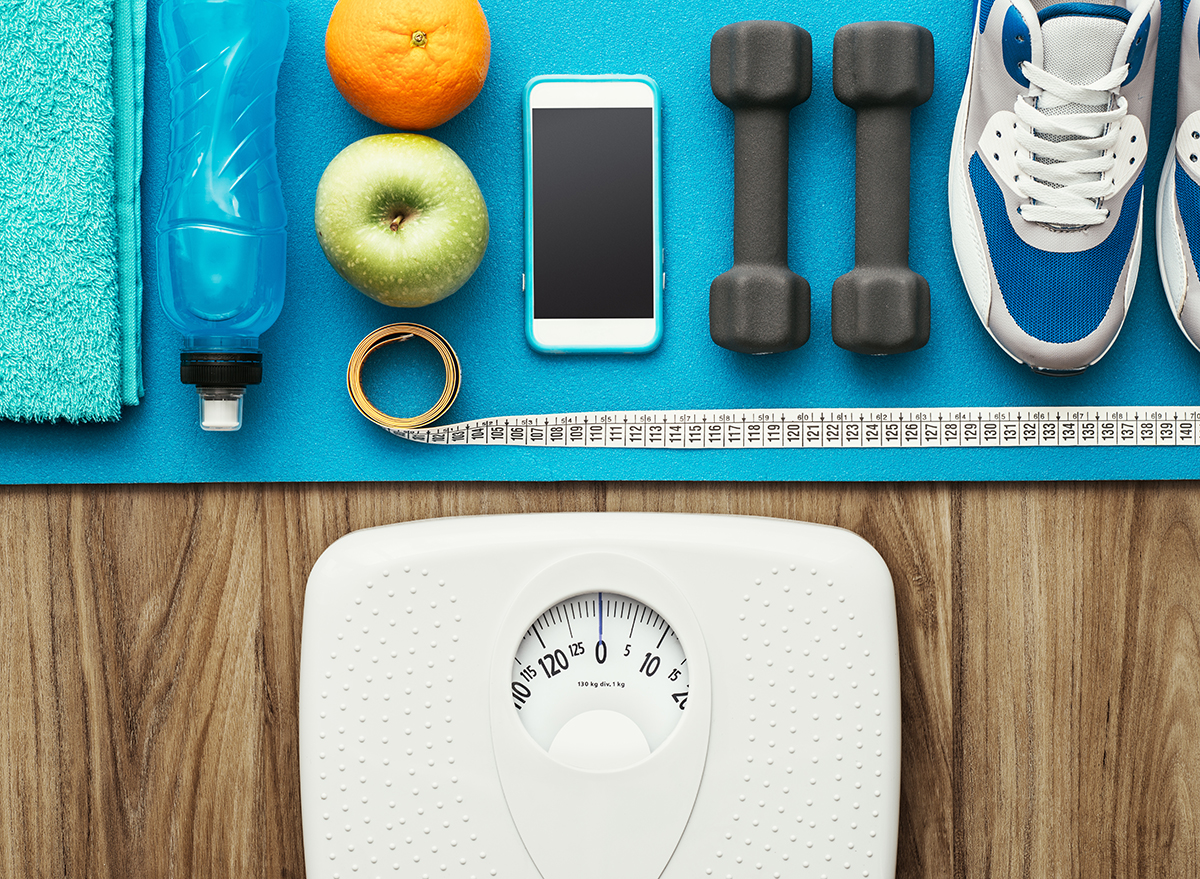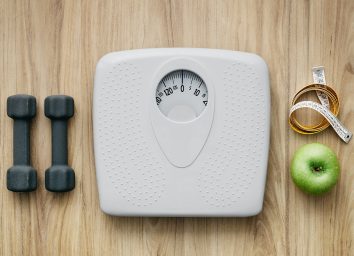Why Is Losing Weight So Confusing? Experts Demystify the Burning Question

Losing weight, as a concept, seems relatively simple: Eat fewer calories than you burn in a given day, and pounds will drop off… right? Well, unfortunately, anyone who has ever tried a diet knows it's not that simple. Losing weight can be difficult and confusing to boot, and while you may find yourself wondering why it is so hard to lose weight, it's important to note that achieving your goals is far from impossible.
We spoke to experts to pinpoint what it is exactly that makes losing weight so tricky and what you can do to demystify weight loss, once and for all.
Figure out what's causing your weight gain.
The first thing to note is that weight gain is a complex issue that could be linked to a number of factors, which then makes losing weight even more complicated.
"I always start with the physiological," says Elise Museles, certified Eating Psychology and Nutrition Expert and podcast host of Once Upon a Food Story. "Sometimes, it's more objective to rule some things out."
Metabolism, allergies, intolerances, and preexisting conditions like PCOS can all contribute to weight gain, as can hormone imbalances, notes Alisa Vitti, a functional nutrition and women's hormone expert and founder of FLO Living, a modern hormone healthcare company.
"I feel that for women, weight loss is made more difficult because they don't factor in their hormones—like insulin, cortisol, and estrogen, and how they fluctuate throughout the cycle and affect metabolism, muscle gain, and fat loss," she says. Museles also notes that issues, like not getting enough sleep or not drinking enough water, can hinder weight loss efforts, too.
"When you're really tired, you often crave carbohydrates," she notes. "And when you don't sleep well, you're not thinking as clearly, and you don't make good choices. It's unbelievable how when you're properly hydrated, your body works smoother."
Once these physical issues are off the table, you can then focus on the root cause behind most weight loss woes: your brain. Museles notes that many people are "stuck in a story" about the cause of their weight gain, thinking in their minds 'I have a slow metabolism, or I'm unlucky, or these are my genes.' But, she cautions, these sorts of preconceived notions might actually be causing the issue you think you're diagnosing.
"Your thoughts can actually create a stress response in your system," she says. "If you believe all of those things, and you sit down to a meal, thinking 'Oh my God, am I going to gain weight? Am I doing it right?' You're releasing cortisol, and that has a whole hormonal cascade. Your metabolism doesn't work as efficiently; everything just shuts down and doesn't function the way it does when you're relaxed."
J.D. Roth, co-creator of reality show The Biggest Loser, notes that it's easy to get stuck in a rut of self-sabotage if you don't confront the psychological reasons behind your weight gain.
"When people lose sense of purpose or sense of passion, they create this pleasure principle in the brain: 'I feel bad, I eat a donut, I feel good,'" he says. "So it's just this self-fulfilling prophecy that continues, and unless you deal with the emotional side of things, there's no diet or food type that's going to help you long-term."
Museles recommends reframing your thoughts around food as much as you can, and above all, being kind to yourself as you set off on your weight loss journey.
"You want to try to work on your mind as much as you're working on your body," she says. "You can still want to change and improve, but from a loving place. Nothing good comes out of hating yourself."
Don't take a one-size-fits-all approach.
It's tempting to be inspired by the weight loss successes of a family member, friend, or co-worker, and you might try whatever their secret is and see it doesn't really do much to help you shed those unwanted pounds. It's easy to understand why this would confuse you, but instead, keep in mind not all weight loss techniques will work for all people.
"I like to think of our bodies as fingerprints, unique to ourselves and incomparable to another," says Saskia (Sassy) Gregson-Williams, a former ballerina, personal trainer, best-selling cookbook author, and founder of Naturally Sassy, an online workout studio, recipe platform, and app. "This approach helps us understand that there is no general rule of thumb and that all lifestyle factors will look different per the individual."
When it comes to choosing a weight loss protocol, from keto to paleo to veganism to calorie counting, consider the emotional and psychological factors of the diet that may help or hinder your weight loss. Are you going to be able to maintain cutting out whole food groups, for example? Will you have time to cook all of your meals at home, or will you end up overwhelmed and ordering takeout? Use the answers to these questions to guide your experimentation with different protocols.
"I think that curiosity is great when it comes to losing weight," says Museles. "Even if you choose something that might not be right for you, you're still stopping whatever patterns you were in and trying to become aware of what they were and what you want it to be. I think that awareness is the first step for weight loss for everyone. Just saying, 'I'm gonna do things differently,' is huge." She also recommends tweaking eating protocols to suit your lifestyle and needs.
"I think that there's a culture now where people are clinging to diet labels too tightly," she says. "Use those philosophies that have worked for so many people as a jumping-off point." From there, let your body and your intuition be your guide. Of course, to follow this tip, it's essential to hone in on a skill that many are sorely lacking that often can contribute to the confusion you might have when it comes to losing weight: listening to our bodies. But recovering this instinct isn't out of reach.
"It's amazing what you do if you just sit there and you take three deep breaths before you decide what to eat," says Museles. "It makes such a difference in your clarity and in the hormones while you're eating your meal." Ideally, you just want to find a plan that works for you. This might begin with experimentation, but for our experts, it should also include a professional.
"Dietitians can help you set yourself up for success and de-bunk some beliefs you may have about your current diet," says Gregson-Williams.
An expert can also help you get to the bottom of why certain protocols might work better for you than others.
"It's important to understand that weight loss is no longer a conversation about calories in vs. calories burned via exercise that leads to fat loss—it's about looking at inflammation, gut health, hormones, fitness, and food quality," says Vitti. "I think it's essential to do your research and get connected to a community of like-minded individuals who share your goals and struggles—the support and accountability are key."
Don't be afraid to get help from other sources as well, like meal kit companies, which will take much of the guesswork out of planning and shopping for meals.
"Obviously I'm a big believer in getting support where you need it," says Museles. "In an ideal world, we would all cook our own meals. We would do things from scratch. But I understand that that's not realistic for everyone, so having healthier options ready is so much better than calling takeout."
Small steps are better than taking none.
Whatever system you pick, commitment is key—and as soon as possible.
"It doesn't have to be Monday or New Year's," says Museles. "You can change it the very next meal. People forget that, and they wait for the perfect, ideal circumstances, and that's not how life is."
Once you've made the commitment, announce it to those around you to help keep yourself honest.
"I really believe that asking for help is the number one thing you can do, so by that I mean, plant the flag in your purpose, your mission," says Roth. "This year, I'm gonna lose 50 pounds.' Tell everybody! The more people you tell, the less shame you'll have."
Above all, remember that there are no quick fixes: a diet might help you lose weight, but it's not the key to keeping it off.
"Diet culture feeds into the idea that the quicker and more extreme diets are the ones to follow, and this route to weight loss is often very short-lived," says Gregson-Williams. "One may lose the weight quickly but won't be able to maintain it once they revert to their regular diet and exercise program."
So instead, set yourself up for success with realizable goals that will stretch over a long period of time.
"Small but consistent steps are key," says Gregson-Williams. "When it comes to exercising, don't set yourself up to fail by promising you'll workout longer than you know is feasible right now. It's better to do 15 minutes every day at home than an hour once a week. Once you get into the habit of 15 minutes daily and stick to that for a month you can increase the time to 20 or 25 minutes."
And above all, don't beat yourself up if you misstep.
"You have 21 chances a week to make a good choice," says Roth. "What defines you is not the mistake you make—it's what you do the minute after you make the mistake."








